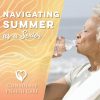You’ve probably heard of “hypothermia,” but did you know “hyperthermia” can be just as dangerous? Hyperthermia is an umbrella term, referring to several conditions that occur when your body’s heat-regulation system can’t handle the heat in your environment. Illnesses resulting from overheating include heat stroke, heat exhaustion, heat edema, heat syncope, and heat cramps. Even the mildest of heat-induced conditions poses a high risk, as it can quickly escalate into heat stroke if not treated.
It’s important to note that seniors are especially prone to heat-related illnesses, especially exhaustion and heat stroke. With aging and the gradual deterioration of the central nervous system, the body can’t adjust to sudden, extreme changes in temperature or regulate its internal temperature as well as it once did. Sweating is one way the body adjusts to and deals with extreme heat, and as a person ages, they sweat less.
Other known health conditions faced by seniors also factor into the risk of heat stroke. Issues such as poor blood circulation, high blood pressure, mental illness, and diseases of the heart, kidneys, and lungs can make people more susceptible. Additionally, the medications and side effects associated with those conditions also increase the risk. Even certain health practices, such as a low sodium diet, can contribute to an individual’s risk to heat-induced illnesses.
What is heat stroke?
Heat stroke (also known as “sunstroke”) is the most dangerous heat-induced illness, and occurs when the body overheats and its core temperature reaches at least 104 degrees Fahrenheit (or 40 degrees Celsius).
Heat stroke attacks the central nervous system and can cause serious brain damage and harm to other internal organs, and even result in seizures, coma, or death.
Warning signs and symptoms of heat stroke can include:
• Dizziness, light-headedness
• Nausea and/or vomiting
• Dry, hot, flushed skin
• Racing heart rate
• Shallow breathing
• Muscle cramps and/or weakness
• Throbbing headache
• Slurred speech
• Agitation
What is heat exhaustion?
Heat exhaustion is a milder condition than heat stroke, but still has adverse effects. According to WebMD, there are two types of heat exhaustion: water depletion and salt depletion. If not treated soon enough, heat exhaustion can progress into heat stroke.
Other heat-related issues include heat edema (swelling in the hands and feet due to standing in or otherwise being exposed to intense heat), heat syncope (dizziness or fainting), and heat cramps (muscle spasms caused by overexertion in hot conditions, and the resulting fluid and electrolyte loss).
Warning signs and symptoms of heat exhaustion can include:
• Confusion
• Fatigue
• Clammy skin, even goosebumps
• Thirst
• Fainting and/or feeling faint
• Headache
• Low blood pressure when standing
• Lack of sweating
• Muscle cramps
• Dry, swollen tongue
• Seizures
Prevention tips
- Stay hydrated — don’t wait until you feel thirsty to drink water! Thirst is a sign of mild dehydration. Drink plenty of non-alcoholic, non-sugary, caffeine-free liquids.
- Stay indoors — sometimes the safest plan is to avoid the heat altogether. Pay attention to the weather reports and plan accordingly. That said, staying inside the air conditioning doesn’t necessarily mean staying homebound. There is a plethora of air-conditioned public places suitable for seniors, such as movie theatres, libraries, and shopping malls.
- Wear lighter, loosely-fitting clothing — additionally, wear a hat and sunglasses and apply sunscreen when outdoors.
- Avoid alcohol consumption — alcohol dehydrates the body and can alter a person’s ability to regulate their body temperature.
- Restrict outdoor activity during peak temperatures — the heat usually reaches its hottest point between the hours of 10 a.m. and 6 p.m. Reserve any outdoor exercise or activities (such as gardening, yardwork, running or walking) to a cooler time of day or night.
- Seek shade — rest in shady areas to cool down.
What you can do in a heat emergency
- If you think someone is experiencing a heat-induced illness, call a doctor. Depending on the severity, you may need to call 911.
- Bring the affected person into the shade or air-conditioned indoors if possible.
- Cool down the affected person with a fan, a cool wet washcloth or towel, an ice pack, and/or a spritz or misting of cool water.
- If possible, have the affected individual hydrate by drinking water.
Enjoy the warm summer sun, but make sure to keep yourself and your senior loved ones safe!
If you found an error, highlight it and press Shift + Enter or click here to inform us.



